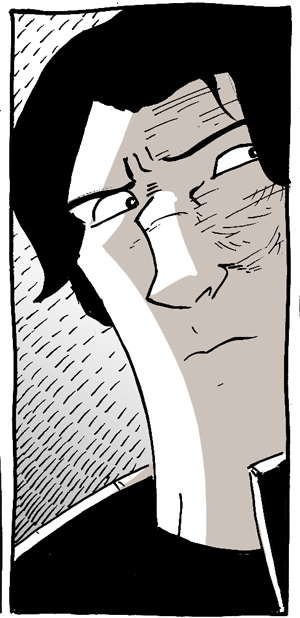The Long John Primer, Part 3
The first week of Long John updates hangs overhead and, naturally, I begin to worry. I want to explain everything before the first page updates; I want to immerse every reader into Long John’s world from the get-go; I want you to know everything about everybody with all the research and changes that have happened since I started putting this thing to paper. But that’s not how stories work. I only dole out pieces at a time. Some pieces you’ll never see, and that’s okay.
What I will do, however, is let you in on a little bit of the background, inspiration, and motivation that has made Long John what it is. For the next two days, you’ll be getting chunks of what helped make Long John into the comic it is (or will be).
3. The Hammett Factor
Long John isn’t a mystery in the strictest sense; the crux of the story isn’t finding out “whodunit.” It’s a mystery in the sense that Dashiell Hammett wrote his “hard boiled” detective stories. These stories are less about finding out what happened and are more about an escalation of events––usually unpleasant ones. The cacophony of lies, violence, and mystery pile upon each other until it all falls apart and Hammett’s hero (usually a stoic badass) is left standing alone amid the ruin. In that sense, Long John is very influenced by Hammett.
This is best exemplified in Hammett’s famous-but-not-as-well-known-as-the-Maltese-Falcon 1929 novel, Red Harvest. It’s a strange book that follows a nameless badass, referred to only as the Continental Op[erative] who wanders into a town that has become the battleground for two powerful gangs. Using his anonymity and his own abilities of deception, The Continental Op effectively takes down both gangs, but leaves the town in rubble before moving on to his next gig. If this plot sounds familiar to you, Red Harvest was the direct inspiration for Kurosawa’s Yojimbo which, in turn, was the direct basis for the Sergio Leone spaghetti-western and Clint Eastwood vehicle, A Fistful of Dollars. So, in a sense, a hard-boiled detective story is a progenitor to the modern western anyway.
Hammett himself was also quite a badass. He served as an agent for the Pinkerton Detective Agency, and the shenanigans he wrote about in Red Harvest were actually based on a case he experienced in Montana. His prose is blunt and descriptive and would easily lose a talent contest to the very poetic and elegant Raymond Chandler. However, I find Hammett a more exciting read not only for the machismo of the writing, but of the veracity Hammett himself brings to his stories because he may very well have lived them.
While I’ve never been a gunslinger, I do like the rough-and-tumble approach of Hammett’s stories, especially Red Harvest. It’s safe to say that Long John won’t have an easy time getting what he wants as the story goes forward, and that’s mostly thanks to Dashiell Hammett.
Also, read about The Eastern Sierra Nevada Factor, The Kurosawa Factor, The Western Factor, The Heavy Metal Factor, and The Indie Comics Factor.


Discussion (7) ¬